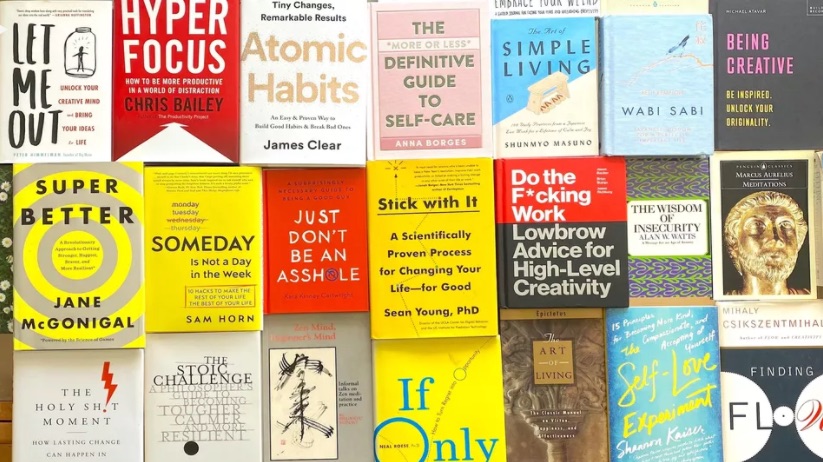All self-help books are basically the same. Here’s how yours can be different.

I’m grateful to Chris Taylor, who wrote a piece on Mashable that breaks down everything you learn from self-help books — and why they’re all the same. If you’re an author, you may find it depressing. Especially if your ideas are ordinary.
The piece is called “Every self-help book ever, boiled down to 11 simple rules.” And here are Taylor’s rules:
- Take one small step.
- Change your mental maps.
- Struggle is good. Scary is good.
- Instant judgment is bad.
- Remember the end of your life.
- Be playful.
- Be useful to others.
- Perfectionism = procrastination
- Sleep, exercise, eat, chill out. Repeat.
- Write it all down.
- You can’t get it all from reading.
I guess we’re done. No need to ever read or write another self-help book. Just do this stuff and your life will be better.
There must be more to it than that
I don’t completely agree with Taylor’s list. There are things he has missed or oversimplified. But I am with him in spirit. When you read a “motivational” book these days, you are likely to say to yourself “this sounds familiar.” Every chapter is like a truism — and the thing about truisms is that while they may be true, they are trite.
So if you want to write a self-help or motivational book, you need to concentrate very hard on differentiating. If your core message is “You can do it! Believe in yourself!”, then you are a fraud — and an unoriginal fraud at that.
The fact remains, though, that reading or hearing about what to do, at a high level, does not tend to be effective. (If it were, then all the doctors telling us to “eat right and exercise” would have cured the obesity epidemic.) So here’s my own short list of suggestions how to be original and differentiated in a book full of advice. You can do one or more of these in any self-help book you are planning.
Be contrary
Just turn the usual advice on its head. Take Tim Ferris’s The 4-Hour Work Week. That is a book about how to be lazy in a creative way. It’s the only self-help book I ever read that concentrates on how to work less, and work less hard. And that makes it stand out.
Cite original research
Do you have access to neuroscience research about productivity? To the activity logs of 2.3 million people? To the insights of top coders? To everyone’s Google searches? These are original sources of content. They’re likely to reveal something that people don’t already know. If you can derive new types of advice from original research, your book can stand out.
Address a trend or technology
Things are not exactly as they always have been. People and their brains may be the same, but technology is different.
So tell us how to be productive and motivated on mobile devices. Or while stuck in our homes using teleconferencing. Or using agile development techniques. Or with Slack.
Those trends could yield new insights. Readers may learn something they didn’t know before. But if your book is fueled by trends, be aware that others are probably writing a similar book, and both your books and theirs may have a shorter shelf life.
Be practical and tactical
It’s one thing to say “manage your time carefully.” But do you have a system for doing that, as David Allen created in Getting Things Done?
If you can present a series of steps or a plan for attacking a problem, you can create action, not just mindless musing.
Focus your audience
Is your book a self-help book for victims of sexual abuse? A book for people entering retirement? Is it perfect for technology executives, bankers, advertising copy writers, teenagers, or new moms?
“You can be better” is a hard sell if “you” means “whoever can read.” But new moms and advertising copy writers have specific issues — and will be receptive to solutions that address those issues. That’s why there are hundreds of individually targeted Chicken Soup for the Soul books.
Tell great stories
Do you have an incredible set of experiences that on one else has ever heard of? Do you repair antennas on top of tall buildings? Did you take a tour of 200 rural American towns? Did you work on the winning campaigns of both a Democratic candidate and a Republican candidate?
If you have unique experiences and can write about them in a compelling way, people will learn from your experience.
There are a few people, like Michael Lewis and Malcolm Gladwell, who can tell other people’s stories in incredibly motivational ways. Perhaps that’s you. But it probably isn’t — they’re unique talents.
Above all, differentiate
These are not the only ways to stand out. Maybe you have a different one.
But you’d better have one, because the world certainly does not need another generic self-help book.
Incredibly empowering! The 7 “P’s” mantra—especially Proper, Prior Planning Prevents Pitifully Poor Performance—is such a smart framework for parents in advocacy. Thank you for the practical guidance!